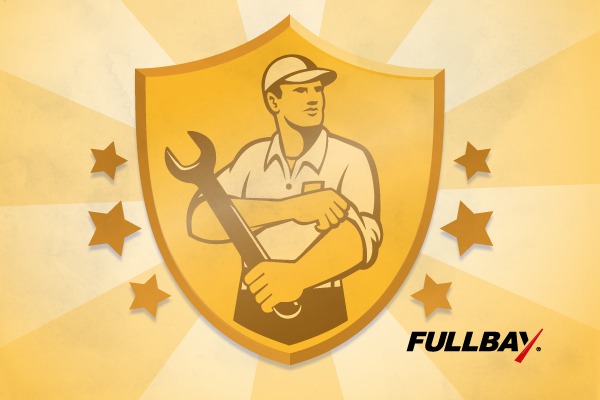Should I Be A Mechanic? And Other Existential Questions

Is being a mechanic worth it?
It’s probably not the most existential question you’ve ever asked, but if you’ve landed on the Fullbay website, odds are you either are a mechanic or were one at some point — or you’re thinking about becoming one.
If you’re in this last group, congratulations! This post is for you.
You’ve probably heard the old cliche: “There’s never been a better time to become a fill-in-the-blank.” That’s actually true when it comes to heavy-duty repair work. There is still a shortage of technicians — a shortage of nearly 30,000 — who can work on heavy-duty vehicles, which means there are plenty of trucks that need repairs — and plenty of shops looking to hire.
If you’re still waffling, we’ve put together a few reasons why you should definitely become a mechanic.
Job security.
There will always be a need for mechanics.
Yes, the industry is going to change, and you’ll likely have to change with it. But trucks and equipment will always need maintenance and repairs. Your job is not just going to evaporate as technology marches on, because — surprise! — even the eventual self-driving trucks will need someone to work on them. Robots can do a lot of cool stuff, but there is still the need for human ingenuity and know-how.
Provided you have a solid skill set and any state-required certifications, you can work just about anywhere. Since trucks travel all over the continental United States, there will be calls for the folks who can repair them in big cities and in more rural areas. You won’t be limited to one specific area where all the heavy-duty trucks go for their repairs.
Money is nice.
Rule number one of heavy-duty repair salaries: They can vary wildly.
Rule number two of heavy-duty repair salaries: You can make a lot of money.
How much you ultimately make will depend on your own skill set, your location, and where you work — at an independent shop, at a dealer, or for yourself. According to the Bureau of Labor Statistics, the median annual wage for heavy-duty repair is $47,350, while those in the highest 10 percent of the field pocketed over $70,000 a year. The highest-paid techs may clear even more than that.
We’re not suggesting you enter a field purely with money in mind, but no one ever said, “Gosh, I wish I had a lower salary.” The more money you earn, the more you can fund your retirement, or take care of your family, or take off for a vacation somewhere exotic.
Learn new skills.
Sure, you can get a basic ASE certification in heavy-duty trucks, but once you have your working knowledge secured, a whole new world opens up to you. We wrote about it here, but explore for yourself what additional certifications and sub-industries you can pick up. You could be on a boat!

We aren’t just talking about hands-on skills, though. Part of being a mechanic is talking to people, which means your communication skills must be up to scratch. Regardless of your feelings about customer service, it’s a useful skill to have in your back pocket no matter what you end up doing. Moving to another shop? You’ll still have to talk to people. Shifting into an entirely new line of work? Unless you shut yourself up in a room hunching over a computer, odds are you’ll need to deal with clients, customers, and coworkers. Those service skills will come in handy.
Fix your own stuff.
You probably don’t roll into work in a big-rig (though if you do, please send us a picture), but the mechanical aptitude you develop working on heavy-duty trucks will transfer to the rest of your life. You won’t look at broken equipment as a setback but instead a challenge to be solved. Bonus: Your friends and family will hit you up to help them out with mechanical stuff, which can turn into a decent side gig if you charge for it (which frankly you should). And let’s face it, being known for your mechanical handiness is not a bad thing.
(Slight caveat: This can also work against you, as your entire family and friend group will probably turn to you for advice and repairs on everything from their vacuum cleaners to their parents’ 1950s-era Chevy. Make sure you set some boundaries on what your crew can ask of you.)
You’ll also meet a lot of cool people along the way, from individual drivers who bring their rigs into the shop to fleet managers scheduling PM services. As a mechanic, you almost can’t help networking; most of the people you speak to at work will know your language or want to learn it, and the more people you talk to, the more opportunities open up to you. New friends, new gigs, even new jobs might always be just around the corner.
You’re contributing to something important.
Ever step back to look at the big picture of trucking? Almost 70% of the country’s goods are transported by truck. That’s 70% of everything: food, clothing, electronics, books, medicine. Without proper maintenance and repair, the trucks that haul those goods across the highways and between states and cities aren’t going to be able to haul much at all.
By keeping these trucks functioning and on the road, you’re helping people get the goods they want and need. Yeah, maybe you don’t care if Flora in Tampa gets her avocados — but Flora in Tampa also needs the insulin shipped in big (usually refrigerated) trucks. We don’t see the human stories behind a lot of transportation, but they’re there — and you’re helping them.
If you’re still going back and forth on whether jumping into heavy-duty repair is for you, we hope we’ve been able to shed some light on how good a career it can be. Sure, we’re a little biased (we can admit to that), but we’re also all about following your passions. If you keep coming back to becoming a mechanic, then it’s probably something you should investigate.
Good luck on whatever you decide — we’re rooting for you!

